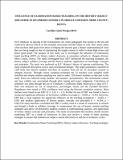| dc.description.abstract | Over emphasis on passing in the examinations can create pedagogies that incline to the test and could have adverse effects on the intended curriculum and the output as well. This comes about when teachers shift goals from those of helping the learners gain a deeper understanding of what they are being taught to that of reproducing the taught content in order to attain high scores and hence good grade. The purpose of this study was to investigate the influence of examination based teaching (EBT) on history subject discourse in secondary schools in Abogeta divison, Meru County, Kenya. The study investigated how EBT influenced the teaching strategies, the history subject syllabus coverage and the history students’ application of knowledge, concepts and principles. The study was anchored on B.F. Skinner’s theory of operant conditioning. The study employed descriptive survey and correlational designs. The target population consisted of 1203 form four history students and their 32 teachers from all the 24 secondary schools in Abogeta division. Through census sampling technique the 32 teachers were sampled while stratified and simple random sampling was used to select 120 history students to take part in the study. Data was collected using students’ and teachers’ questionnaires. The instruments content and face validity was ascertained through pilot testing and expert judgments. Calculation of reliability was done through the use of Cronbach’s Coefficient Alpha which give a value of 0.7. Data was analyzed by use of frequencies, percentages, means and the standard deviation. Hypotheses were tested at 95% confidence level using the Pearson correlation analysis. Most teachers were found to use EBT (x ̅= 3.22, s = 1.1). Further the use of EBT was found to have a strong and significant influence on the history syllabus coverage (r = 0.969, p < 0.05). However, EBT had a weak negative but significant influence on the teaching strategies(r = -0.403, p < 0.05) and students application of history subject concepts and principles (r = -0.394, p < 0.05).The study therefore concluded that EBT is widely used as a mode of instruction in schools and though it leads to syllabus coverage, it compromises the use of learner centred teaching strategies and above all diminishes students acumen in understanding, analysis, and application of history subject concepts and principles. The study recommended that teachers should restrain employing EBT as a mode of instruction in class and involve a variety of other teaching strategies to ensure that students use subject content effectively in and out of academic circles. | en_US |

